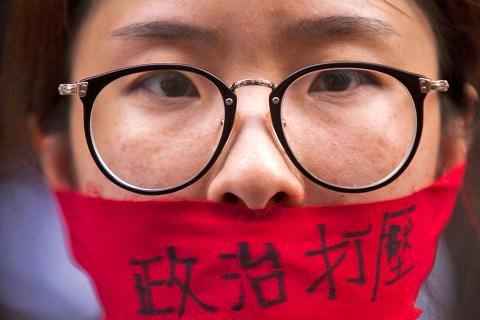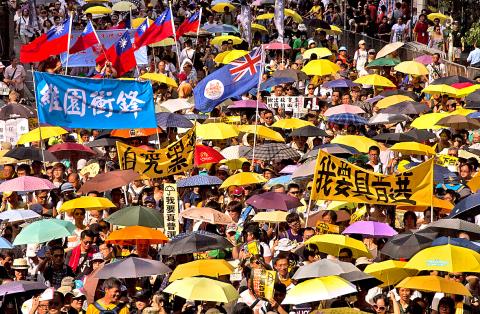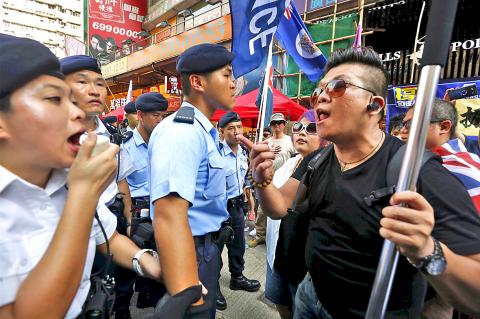Tens of thousands of protesters yesterday joined a pro-democracy march in Hong Kong, the anniversary of the territory’s handover to China, in what organizers described as an opportunity to work out the movement’s next step.
Crowds gathered in Victoria Park in the afternoon, many carrying yellow umbrellas — a symbol of the democracy movement — before marching to the government’s offices in central Hong Kong.
“The most important thing is to express disapproval to the Hong Kong and Chinese communist government for suppressing the freedoms of Chinese people and real elections for Hong Kong people,” protester Wong Man-ying, 61, said.

Photo: EPA
“Things are quickly transforming to fit a Chinese model,” office clerk Anna Cheung added. “We need Beijing to hear our voices.”
The march’s organizers, Civil Human Rights Front, said the turnout was 48,000, lower than in previous years, after almost 12 months of rallies in the territory.
Last year’s march saw huge crowds gather as discontent surged over restrictions by Beijing on how Hong Kong would choose its next leader, and organizers said a record 510,000 attended.

Photo: EPA
“Momentum has slowed down after the veto over political reform,” Civil Human Rights Front’s Johnson Yeung (楊政賢) said, but he insisted turnout numbers this year were not important.
Instead the march was a chance to reshape the message of the democracy movement, he said, which has splintered since the end of the mass rallies in December last year.
“Right now people are asking: ‘What next?’ after the veto,” Yeung said. “We hope the march can set the political agenda and give citizens a chance to discuss how to bring the democratic movement forward.”

Photo: Reuters
Political groups set up stalls and addressed the crowds on loudspeakers while protesters fanned themselves in the oppressive heat.
In a speech at a ceremony for the handover anniversary, Hong Kong Chief Executive Leung Chun-ying (梁振英) criticized lawmakers who rejected the reform package, using instability in Europe to argue that other issues should now take precedence over democratic reforms.

A Ministry of Foreign Affairs official yesterday said that a delegation that visited China for an APEC meeting did not receive any kind of treatment that downgraded Taiwan’s sovereignty. Department of International Organizations Director-General Jonathan Sun (孫儉元) said that he and a group of ministry officials visited Shenzhen, China, to attend the APEC Informal Senior Officials’ Meeting last month. The trip went “smoothly and safely” for all Taiwanese delegates, as the Chinese side arranged the trip in accordance with long-standing practices, Sun said at the ministry’s weekly briefing. The Taiwanese group did not encounter any political suppression, he said. Sun made the remarks when

The Taiwanese passport ranked 33rd in a global listing of passports by convenience this month, rising three places from last month’s ranking, but matching its position in January last year. The Henley Passport Index, an international ranking of passports by the number of designations its holder can travel to without a visa, showed that the Taiwan passport enables holders to travel to 139 countries and territories without a visa. Singapore’s passport was ranked the most powerful with visa-free access to 192 destinations out of 227, according to the index published on Tuesday by UK-based migration investment consultancy firm Henley and Partners. Japan’s and

BROAD AGREEMENT: The two are nearing a trade deal to reduce Taiwan’s tariff to 15% and a commitment for TSMC to build five more fabs, a ‘New York Times’ report said Taiwan and the US have reached a broad consensus on a trade deal, the Executive Yuan’s Office of Trade Negotiations said yesterday, after a report said that Washington is set to reduce Taiwan’s tariff rate to 15 percent. The New York Times on Monday reported that the two nations are nearing a trade deal to reduce Taiwan’s tariff rate to 15 percent and commit Taiwan Semiconductor Manufacturing Co (TSMC, 台積電) to building at least five more facilities in the US. “The agreement, which has been under negotiation for months, is being legally scrubbed and could be announced this month,” the paper said,

MIXED SOURCING: While Taiwan is expanding domestic production, it also sources munitions overseas, as some, like M855 rounds, are cheaper than locally made ones Taiwan and the US plan to jointly produce 155mm artillery shells, as the munition is in high demand due to the Ukraine-Russia war and should be useful in Taiwan’s self-defense, Armaments Bureau Director-General Lieutenant General Lin Wen-hsiang (林文祥) told lawmakers in Taipei yesterday. Lin was responding to questions about Taiwan’s partnership with allies in producing munitions at a meeting of the legislature’s Foreign Affairs and National Defense Committee. Given the intense demand for 155mm artillery shells in Ukraine’s defense against the Russian invasion, and in light of Taiwan’s own defensive needs, Taipei and Washington plan to jointly produce 155mm shells, said Lin,